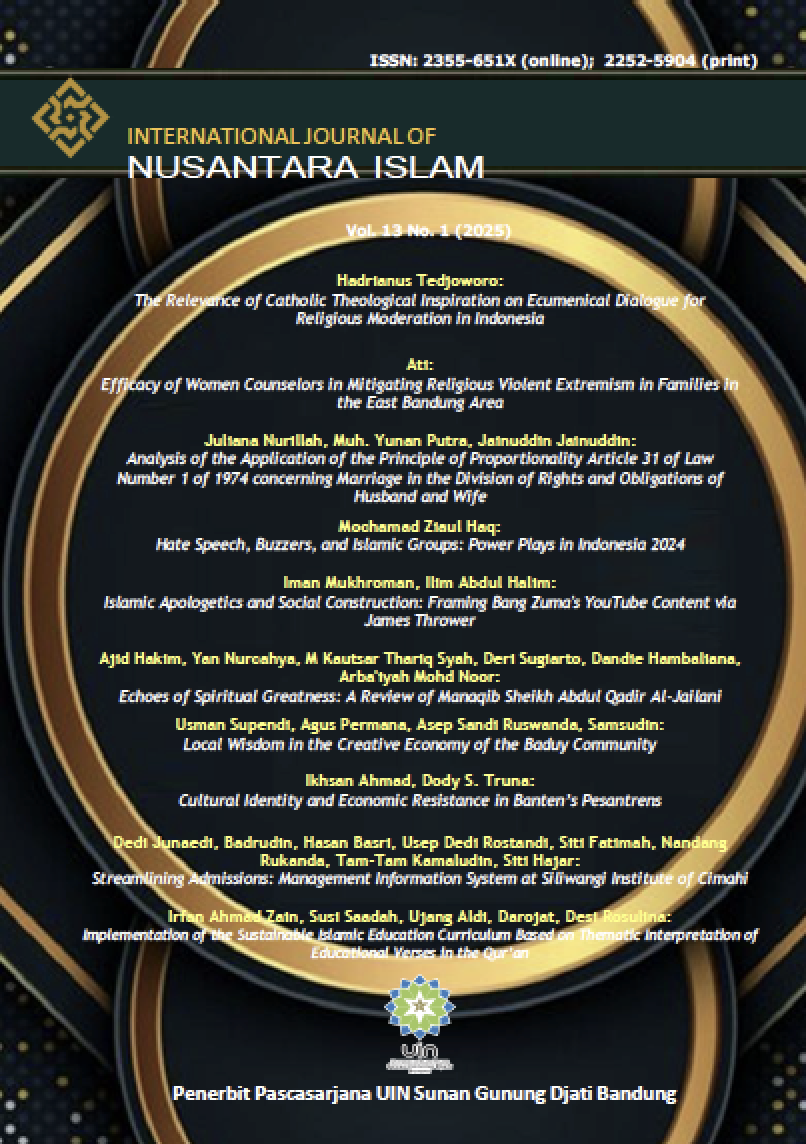Efficacy of Women Counselors in Mitigating Religious Violent Extremism in Families in the East Bandung Area
Main Article Content
Abstract
This study explores the efficacy of female religious counselors in mitigating religious-based violent extremism within the domestic sphere, focusing on East Bandung—an area with a high susceptibility to radicalization. Employing a qualitative descriptive approach, data were collected through participatory observation, in-depth interviews, and documentation of field activities conducted by female religious counselors. The findings reveal that these counselors adopt a feminine da’wah strategy rooted in empathy, dialogue, and everyday narratives, which significantly contributes to building critical awareness, behavioral transformation, and ideological resilience within families and grassroots communities. Their performance demonstrates competency across Bloom's cognitive, affective, and psychomotor domains, allowing for the effective transmission of moderate religious values and the cultivation of tolerant attitudes. Despite their strategic role, these women face structural challenges, including patriarchal resistance, limited access to specialized deradicalization training, and a lack of institutional support. The study contributes theoretically to discourses on gender, religious communication, and community-based security, highlighting female counselors as transformative agents in the fight against extremism. Practically, it underscores the necessity of integrating gender-sensitive policies in national counter-extremism strategies and calls for formal recognition and empowerment of female religious counselors as vital actors in promoting peace, inclusivity, and social resilience.
Article Details
The Authors submitting a manuscript do so on the understanding that if accepted for publication, copyright of the article shall be assigned to International Journal of Nusantara Islam, Sunan Gunung Djati State Islamic University.
The copyright encompasses exclusive rights to reproduce and disseminate articles in all forms and media, including reprints, photographs, microfilm, and similar reproductions, as well as translations. Some or all of the contents of this journal can be stored in databases and transmitted in any form and media without the need for written permission from the International Journal of Nusantara Islam, Sunan Gunung Djati State Islamic University.
The Editors and the Advisory International Editorial Board make every effort to ensure that no wrong or misleading data, opinions or statements be published in the journal. In any way, the contents of the articles and advertisements published in the International Journal of Nusantara Islam (IJNI) are sole and exclusive responsibility of their respective authors and advertisers.
References
Aga, M. M. (2022). Women and Deradicalization Efforts in Kenya: the Case of Isiolo County, 2011-2018. University of Nairobi.
Ahmad, I., & Islam, M. R. (2024). Empowerment and participation: Key strategies for inclusive development. In Building Strong Communities: Ethical Approaches to Inclusive Development (pp. 47–68). Emerald Publishing Limited.
Ahmad, S., & Saepudin, M. (2023). Moderasi Beragama pada Masyarakat Multietnik dan Transmigrasi.
Ahmadi, A., Ajahari, A., & Aliyah, M. (2024). Moderasi Beragama Di Pesantren: Manajemen, Wawasan, Sikap, Dan Internalisasi Nilai. K-Media.
Aidid, S. M. Y. (2022). Mewujudkan Al-Madinah Al-Fadilah dalam Naungan Washatiyah Al-Islam melalui Nilai-Nilai Pancasila. Indonesia Dalam Pusaran Disrupsi Global, 155.

